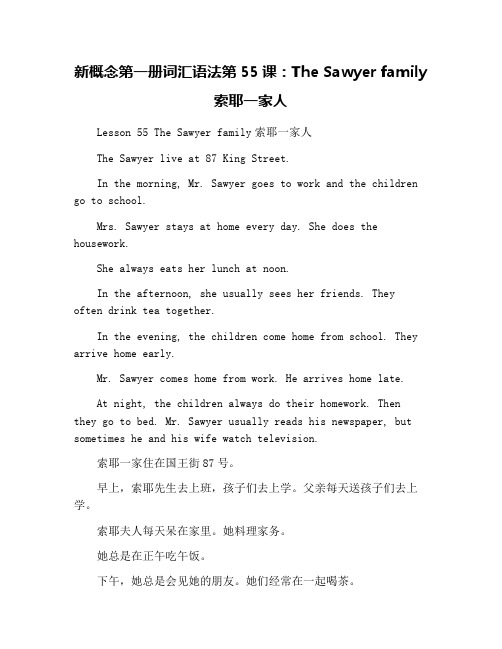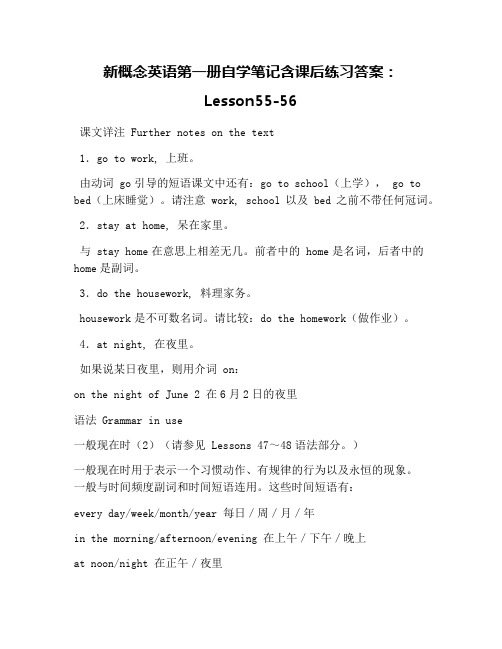新概念1第55课
新概念第一册第55课

时间频度副词的位置
3.在加强语气的句子里,许多副词可以放在第一个助动
词之前,或be动词之前,或者放在句首。如: Usually I go to visit my grandparents on weekends.
4. 在否定句中,频度副词放在not的前或后要依意思来
决定。如: The climate is not always pleasant. The climate always isn’t pleasant.
—He is going there July 28th.
A. on B. at C. in D. to
8. — does it take inutes.
A. How long B. How much C. How often D. How many
练习题
1. Tom is a worker. He _____ in a factory. His sisters ___ __ in a hospital. A. work/ work B. works/ work C. work/ works 2. Who _____ English best in your class? A. speak B. speaks C. speaking 3. Mrs.Read _____ the windows every day A. is cleaning B. clean C. cleans 4.4. We _____ music and often _____ to music. A. like/ listen B. likes/ listens C. like/ are listening
2. stay with sb 和某人在一起 下次来就住在我们这好吗? Why don’t you come to stay with us?
新概念英语单词第一册第55课:索耶一家人.doc

新概念英语单词第一册第55 课:索耶一家人live [lv] v.住,生活【派生】 living生【充】 life生活alive活着的【搭配】 live on...靠⋯⋯生活【例句】A:Who lives with you?A:你和住在一起?B:Kate and Nancy do.B:我跟特和南希⋯起住。
stay [ste]停,逗留【充】 stop over中途停留【搭配】 stay at home待在家stay still 静止不stay out of不参与stay up熬夜【例句】A: How long do you plan to stay here?A:你打算在儿停留多久?B:I will stay here for about ten days.B:我将在儿待大概10 天。
home [hm] 家【派生】 homeland 祖国【单词搭配】 at home 在家 go home 回家【单词例句】A:I must go back home where many things are waitingfor me to settleB: We're very sorry to see you go.A:我必须回国了,很多事正等着我去处理。
B:您要走了,我们感到非常遗憾。
housework['hauswa :k] 家务【单词构造】 house(房子) +work(工作) = housework (家务)【单词搭配】 do the housework做家务【单词例句】A: My mother always says I spend too much timeon watching TVA:我妈妈总是说我把太多的时间花费在看电视上。
B: Then you should finish your homework, and thenhelp your parents with the housework some day.B:那你以后应该先完成家庭怍业,然后帮父母做些家务。
英语新概念第一册仿写55课作文50字

英语新概念第一册仿写55课作文50字English:In Lesson 55 of "New Concept English Book One," the author talks about the importance of punctuality. Punctuality is a virtue that everyone should cultivate. Being punctual not only shows respect for others' time but also reflects one's reliability and responsibility. In today's fast-paced world, time is more precious than ever, and being punctual demonstrates discipline and professionalism. Punctuality is crucial in various aspects of life, including work, school, and social engagements. It enhances efficiency and productivity, contributes to better relationships, and builds trust and credibility. Therefore, it's essential to develop the habit of being punctual from an early age and adhere to it throughout life.中文翻译:在《新概念英语第一册》第55课中,作者谈到了守时的重要性。
守时是每个人都应该培养的美德。
新概念英语第一册第55课

• nnigighhtt 一n般. 指夜夜间里 • 晚安 • good night • 在夜里 • at night • 一整夜 • all night • =the whole night • He always does his
stay with sb和某人呆在一起。 她总是和我呆在一起。
eg: She always stays with me.
欧姆龙贸易(上海)有限公司
home
n. 家 ;adv. 住家,到家 1) n. 家 欢迎来我家
eg: Welcome to my home . 在家
at home 呆在家
stay at home 她总是呆在家
• •
我W们e 通u常su在aulls家yuad做loly我ou们r 的hao家dmv庭e.w作通or业常k 。at
home .
• 她通常在晚上打扫房间。
• eg: She usually cleans her room in the evening .
• together adv. 一起
• 一起做某事
She always eats her lunch at noon 。(在正午)
欧姆龙贸易(上海)有限公司
In the afternoon, (在下午 )
she usually sees her friends 。
他总是会见他的朋友 They often drink tea
together.
他们经常在一起喝茶
新概念英语第一册第55课 (2)

2.The +姓氏复数
The Sawyers live at 87 King Street.
做主语视 为复数, 谓语动词 用复数
KEY WORDS live 住、 生活
live in 住在……(国家或城市)
待在家里
Mrs Sawyer stays at home every day.
She does the housework.
做家务
She always eats her lunch
at noon.
In the afternoon, She usually sees her friends. They often drink tea together.
• 注意:不能说和上一个同学一样的单词或 将土豆掉在地上。
87 King Street
The Sawyers live at 87 King Street.
In the morning,
Mr. Sawyer goes to work and the children go to school.
Their father takes them to school every day.
live at 住在……(有确切地址的小地方)
KEY WORDS
at 5 Zhushan Road. I live ____
He lives ____ in England.
lunch
午饭
n.
breakfast n. 早餐 supper n. 晚饭 have breakfast 吃早餐 have lunch 吃午饭 have supper 吃晚饭
新概念英语第一册 第55课笔记

新概念英语第一册第55课1.the +姓(复数) 表示一家人2.the Sawyer family=the Sawyers索耶一家3.the Black family=the Blacks布莱克一家live in 居住在+大地点live at 居住在+小地点go to work 去上班go to school去上学go to bed 去睡觉go home 回家take ---to ---带---去---stay in/at 呆在(大/小)do the homework/housework做作业/做家务at noon在中午see sb看望某人drink tea=have tea喝茶eat lunch=have lunch吃午饭come home from work下班回家come home from school放学回家after school放学after class下课after work下班arrive in/at到达(大/小)arrive home(省略介词) 到家at night在夜晚at noon在正午(中午12:00)at midnight在午夜(半夜12:00)read newspapers读报纸测试:表示一家人(两种表示)索耶一家(两个短语)布莱克一家(两个短语)居住在+大地点居住在+小地点去上班去上学去睡觉回家带---去---呆在(大/小)做作业/做家务在中午看望某人喝茶吃午饭下班回家放学回家放学下课下班到达(大/小)到家在夜晚在正午(中午12:00)在午夜(半夜12:00)读报纸。
新概念第一册词汇语法第55课:The Sawyer family索耶一家人

新概念第一册词汇语法第55课:The Sawyer family索耶一家人Lesson 55 The Sawyer family索耶一家人The Sawyer live at 87 King Street.In the morning, Mr. Sawyer goes to work and the children go to school.Mrs. Sawyer stays at home every day. She does the housework.She always eats her lunch at noon.In the afternoon, she usually sees her friends. They often drink tea together.In the evening, the children come home from school. They arrive home early.Mr. Sawyer comes home from work. He arrives home late.At night, the children always do their homework. Then they go to bed. Mr. Sawyer usually reads his newspaper, but sometimes he and his wife watch television.索耶一家住在国王街87号。
早上,索耶先生去上班,孩子们去上学。
父亲每天送孩子们去上学。
索耶夫人每天呆在家里。
她料理家务。
她总是在正午吃午饭。
下午,她总是会见她的朋友。
她们经常在一起喝茶。
傍晚,孩子们放学回家。
他们到家很早。
索耶先生下班回家。
他到家很晚。
晚上,孩子们总是做作业,然后去睡觉。
索耶先生总是读报纸,但有时和他的妻子一起看电视。
1.go to work, 上班。
新概念英语第一册自学笔记含课后练习答案:Lesson55-56

新概念英语第一册自学笔记含课后练习答案:Lesson55-56课文详注 Further notes on the text1.go to work, 上班。
由动词 go引导的短语课文中还有:go to school(上学), go to bed(上床睡觉)。
请注意 work, school以及 bed之前不带任何冠词。
2.stay at home, 呆在家里。
与 stay home在意思上相差无几。
前者中的 home是名词,后者中的home是副词。
3.do the housework, 料理家务。
housework是不可数名词。
请比较:do the homework(做作业)。
4.at night, 在夜里。
如果说某日夜里,则用介词 on:on the night of June 2 在6月2日的夜里语法 Grammar in use一般现在时(2)(请参见 Lessons 47~48语法部分。
)一般现在时用于表示一个习惯动作、有规律的行为以及永恒的现象。
一般与时间频度副词和时间短语连用。
这些时间短语有:every day/week/month/year 每日/周/月/年in the morning/afternoon/evening 在上午/下午/晚上at noon/night 在正午/夜里第3人称单数的谓语动词需加以变位,这可分为几种情况:(1)直接加 -s,如:come----comesarrive----arrives(2)以 -sh, -ch, -o 以及 -s结尾的动词加 -es,如:wash----washesgo----goeswatch----watchesdo----does(3)以辅音加 -y结尾的动词,把 -y改成 -i,再加 -es;而元音加-y结尾的动词,只加 -s即可:hurry----hurriescarry----carriesplay----playsstay----stays词汇学习 Word study1.arrive v.(1)到达;到来:We arrived home early. 我们很早就到家了。
- 1、下载文档前请自行甄别文档内容的完整性,平台不提供额外的编辑、内容补充、找答案等附加服务。
- 2、"仅部分预览"的文档,不可在线预览部分如存在完整性等问题,可反馈申请退款(可完整预览的文档不适用该条件!)。
- 3、如文档侵犯您的权益,请联系客服反馈,我们会尽快为您处理(人工客服工作时间:9:00-18:30)。
together 一起 evening 晚上 arrive night 到达 夜晚
Mrs Sawyer goes to work and the children go to school.
1
The Sawyers live at 87 King Street.
2
In the morning, Mr. Sawyer goes to work and the children go to school. Their father takes them to school every day.
3
Mrs Sawyer stays at home every day. She does the housework.
4
She always eats her lunch at noon.
5
In the afternoon, she usually sees her friends. They often drink tea together.
5
afternoon-she – sees- friends drink tea- together
6
evening-children- home – school they-home- early
7
Mr Sawyer- home- work arrives-late
8
night-children – homework they-bed Mr Sawyer – newspaper sometimes -television
NEW WORDS
usually 常 evening
[‘ju:ʒuəli] adv. 通 [’i:vniŋ ]
n. 晚上
together 起 arrive 达 night
[tə’ɡeðə] adv. 一
[ə’raiv]
v. 到
[nait ]
n.夜间
live
住、 生活
live in 住在…… (国家或城市,大地方)
Grammar The subjec(主语) :三单 he/she/it/人名 Mary /Tom/my father /my brother the cat/the girl/the boy… 谓语动词: +-s/-es
She often dusts the cupboard in the morning.
• 1. She always makes the bed in the morning. • He always shaves in the morning. • 3. They sometimes listen to the stereo in the evening.
Example:
washes She (wash)________the dishes every day. Exercise go 1.The children (go)_____to school in the moring. 2.Their father (take) takes _____them to school. stays home. 3.Mrs. Sawyer (stay) ______at does 4.She (do) _____the housework. eats her lunch at noon. 5.She always (eat)____
night 夜晚, 在夜晚
at night
at noon
在深夜(通常11点左右)
在正午
usually
often always sometimes 经常 总是 有时
通常
never
从不
频率副词:使用位置,行前 系后:行为动词前面,系动 词(be)后面。
arrive
arrive in arrive at
I often have / eat lunch at 12:30. has/ eats lunch at school. He usually _________
afternoon 下午;在下午
in the afternoon
evening 晚上, 在晚上
in the evening 是在傍晚(晚上6点左右)
1
The Sawyers87 King Street
2
morning- Mr. Sawyer-work Children- school Their father- school- every day.
3
Mrs Sawyer-home- every day - housework
4
She- eats- lunch- noon
arrive / get / reach home 词,所以其前面不加介词。
• Let’s read and member the new words:
•
• • • • •
live
住、 生活
usually
通常
stay 呆在、停留 home 家 housework 家务 lunch 午饭 afternoon 下午
NEW WORDS
live stay home
[ liv] [stei]
v.
住,生活 v.呆在,停留
[həum ] n. 家;adv. 在家
housework [‘hauswə:k] n. 家 务 lunch [lʌntʃ ] n. 午饭 afternoon 午
[,ɑ:ftə’nu:n] n. 下
live at 住在…… (有确切地址的小地方)
at 58 Shengli Road. I live —— in England. He lives ___
stay 呆在、停留
stay in bed 呆在床上
stay at home
stay with sb.
呆在家里
和某人呆在一起
He usually stays with his family at the weekends .
周末,他经常与家人呆在一起。
housework 家务
do the housework 做家务
together 一起
We always go home together .
我们总是一起回家。
Let’s go to school together !
让我们一起上学去吧!
lunch 午饭
have / eat lunch 吃午饭
1. Who takes the children to school every day ? 2. What does Mrs. Sawyer do at home every day ? 3. When does Mrs. Sawyer eat her lunch ? 4. When does Mrs. Sawyer see her friends ? 5. Does Mr. Sawyer arrive home early ? 6. What does Mr. Sawyer usually do at night?
Listen to the text and answer the questions .
Listen again, and answer these questions:
1.Where do the Sawyers live?
2.In the morning, what does Mr. Sawyer do? What do the children do? What does Mrs. Sawyer do? Mr. Sawyer goes to work. The children go to school. Mrs. Sawyer stays at home and does the housework.
6
In the evening, the children come home from school. They arrive home early.
7
Mr Sawyer comes home from work. He arrives home late.
8
At night, the children always do their homework. Then they go to bed. Mr. Sawyer usually reads his newspaper, but sometimes he and his wife watch television
到达
到达…… ( 大地方) 到达…… (小地方)
in London tomorrow. My father will arrive ____
/ I often arrive ____home early in the evening.
get to / reach 到达…… 到家, home本身可以做为副
